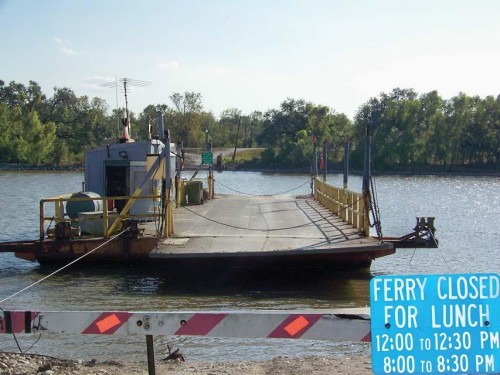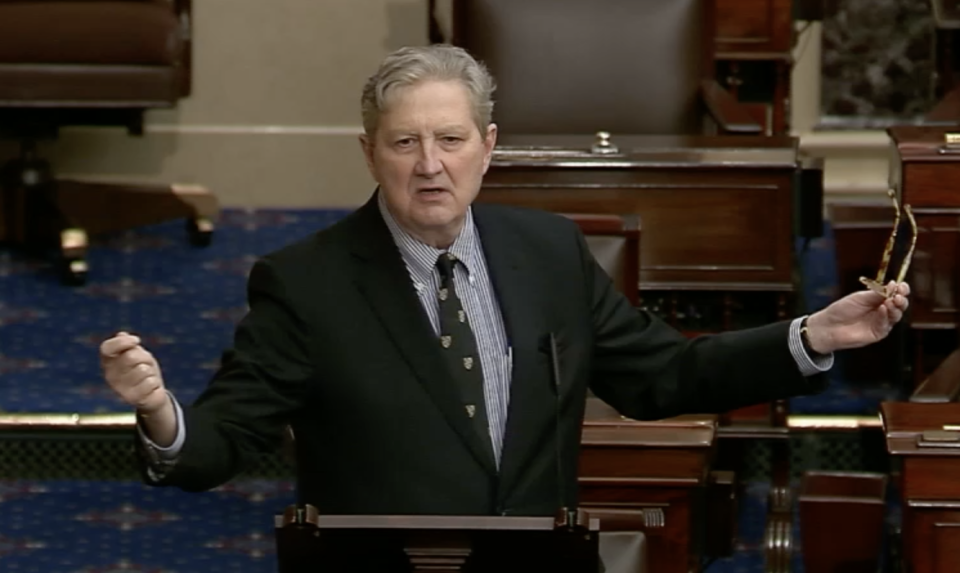
Flore Roger Guillot
December 2, 2008Dec. 4
December 4, 2008Alaskan Gov. Sarah Palin’s “Road to Nowhere” gained the Republic vice presidential candidate fame, but she’s got nothing on the St. Mary Parish Council.
The council is considering pulling the plug on a vehicle ferry that totes travelers to and from Avoca Island, a 16,000-acre private island off Morgan City’s coast. The parish pays more than $270,000 a year – approximately $46 per passenger – to run the free cable ferry.
Tonight, the parish council will consider appointments to a committee assigned the task of studying whether the ferry should continue to operate at St. Mary’s expense.
Avoca Island is home to only one resident, a hired caretaker. All others have been evicted.
Private hunting clubs and various oil and gas interests use the island.
Those traveling to the island can access it only via the ferry. One of the last of its kind, the ferry is pulled along underwater cables. It carries motorists to and from Morgan City to Avoca Island seven days a week, from 6 a.m. to 10 p.m.
St. Mary Parish Councilman Kevin Voisin introduced an ordinance last month looking to suspend the parish shuttle effective Dec. 31.
When the caretaker, a group of Avoca Island camp owners and concerned St. Mary citizens voiced opposition, Voisin opted to postpone the ordinance indefinitely.
In the meantime, committee appointees would have 180 days to seek a cost-savings alternative that removes the expense from the parish’s budget.
According to figures supplied by St. Mary Parish President Paul Naquin, the parish spent $215,000 operating the ferry in 2007. So far this year, $228,000 has been spent. And $270,000 is included in next year’s budget to keep ferry service operational.
Naquin said the parish spends an average of $46 per passenger yearly to shuttle the ferry across the Intracoastal Waterway to the island.
Voisin argues that the money spent operating the ferry would better serve St. Mary taxpayers if were spent on parish roads and infrastructure.
“This (price) does not include the liability insurance we have to carry on that ferry in case someone gets hurt, which this year cost us around $72,000,” the councilman reasons.
But Voisin’s argument doesn’t sit well with Avoca Land Manager Jim Bodin, the island’s sole resident. He is an employee of Avoca Land Inc., a New Orleans-based group that owns the island.
Bodin recently told the parish council that although he is Avoca’s only resident, three cattle operations and oil and gas operations routinely use the ferry.
In addition, about 60 people frequent hunting camps on the island, he said.
Avoca Island is able to avoid a wetlands designation by maintaining cattle operations on a portion of its 16,000 acres, Bodin said.
Workers regularly use the ferry to care for the cattle, he noted.
Cleco and the Corps of Engineers also use the ferry to access oil and gas operations on Avoca.
Bodin said Cleco workers regularly check the transmission lines on the island, which pipe natural gas into Morgan City and Berwick. The Corps maintains the island’s levee system.
“Politicians say their doors are open. Well, has anyone come to speak to us,” he asked the council.
Clay Toups, of Delta Operating Corporation, said his company has operated a gas well on Avoca Island for the past 20 years. During that time, Toups said his company has paid $225,000 in parish property taxes. He said Delta has also paid severance and water bottom royalties to the parish as have other companies operating on the island.
“We sort of feel that we’ve paid our way across,” he said.
Toups suggested cutting the ferry service’s hours. It is currently available 17 hours a day year-round.
Voisin’s notion that the ferry service only benefits an elite few has also angered Jude Cloutier, a commercial property owner who owns eight acres on the island, which he leases to others for barge fleeting and dockside ship repairs.
Cloutier said he would have to shut down if the ferry service is terminated. “Then I would have to see a lower property assessment,” he asserted.
Cloutier has his own fix for St. Mary: Build a bridge to replace the cost of the ongoing ferry service. “I see (the parish) building a cheap, low-level bridge that could open up miles of deep-water access and make money for the parish.”
He said a bridge could be built over the existing nearby locks, which are 75 feet wide.
“There is a lock operator there all day opening and closing the locks. He could open and close the bridge as well, similar to what’s done every day at the Harvey Canal,” he said.
The parish council reasons that for maintaining the ferry service, the parish should get something in return – namely development.
Councilman Gary Duhon said abruptly shutting down the ferry service was tantamount to a “railroad job.”
“I want to see something happen over there – some development,” he said.
Avoca Land Inc. President Robert Baird has since sent the parish council a letter informing members that the Avoca board may have an interest in “reopening discussion regarding development on Avoca Island.”
Baird is an executive vice president for Whitney Bank, whose main headquarters are in New Orleans.
According to documents filed with the Securities and Exchange Commission define Avoca Land Inc. as a “passive royalty company that derives most of its income from royalties, bonuses and delay rentals under oil and gas leases covering its Avoca Island acreage, seismic permits and interest on its investments.”
SEC records indicate Avoca Land Inc. has owned Avoca Island since 1931.
Those same documents also show that in March of 1994, Avoca Land Inc. had $1.2 million in cash on hand, and a total of $4.424 million in assets.
Since the Nov. 19 council meeting, Naquin said he is investigating ways to make island access a win-win for the parish and Avoca landowners, including bonding the money allocated for the ferry service over 15 to 20 years. “This could generate a small amount of money to build a small bridge over the locks,” he said.
The solution may be a tough sell for Voisin. He questions using taxpayer money to serve private landowners.
“Why build a bridge to a hunting club,” he asked. “If Avoca has this kind of money, why don’t they purchase the ferry from us. Frankly, another study about the ferry is not the answer.”
For now, however, that is what the parish council has agreed to do.
Tonight, members will take the first step in appointing citizens to serve on a committee to determine if parish money is best used ferrying vehicles to and from Avoca Island. The council meets at the parish courthouse at 6 p.m. in Franklin.
The ferry to Avoca Island, a 16,000-acre private island off Morgan City’s coast, has cost taxpayers $228,000 to operate so far this year. Next year, the total will increase to $270,000. * File photo













